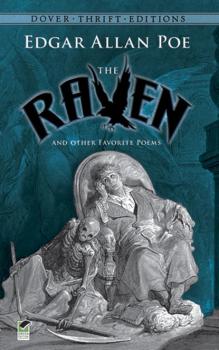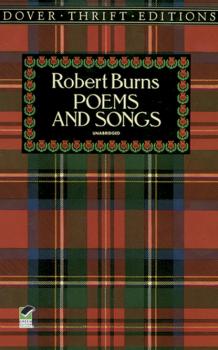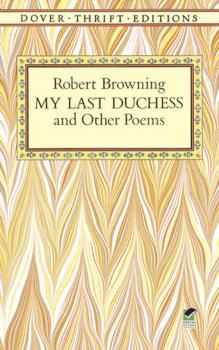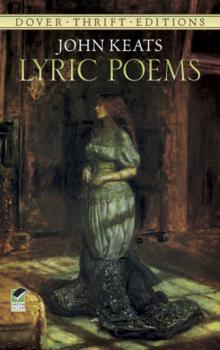ТОП просматриваемых книг сайта:
Зарубежные стихи
Различные книги в жанре Зарубежные стихи, доступные для чтения и скачиванияАннотация
Great title poem plus «Kubla Khan,» «Christabel,» 20 other sonnets, lyrics, odes: «Frost at Midnight,» «The Nightingale,» «The Pains of Sleep,» «To William Wordsworth,» «Youth and Age,» more. All reprinted from authoritative edition.
Аннотация
One of the most famous poems in the English language, «The Raven» first appeared in the January 29, 1845, edition of the New York Evening Mirror. It brought Edgar Allan Poe, then in his mid-30s and a well-known poet, critic, and short story writer, his first taste of celebrity on a grand scale. «The Raven» remains Poe's best-known work, yet it is only one of a dazzling series of poems and stories that won him an enduring place in world literature.This volume contains «The Raven» and 40 others of Edgar Allan Poe's most memorable poems, among them «The Bells,» «Ulalume,» «Israfel,» «To Helen,» «The Conqueror Worm,» «Eldorado,» and «Annabel Lee.» Together they reveal the extraordinary spectrum of Poe's personality — his idealism; his visionary qualities; his responsiveness to beauty, to love, and to women; and his susceptibility to the eerie and the morbid. They reveal, too, his virtuoso command of poetic language, rhythms, and figures of speech — command that would make his one of the most distinctive voices in all of poetry.A selection of the Common Core State Standards Initiative.
Информация о книге
Автор произведения Эдгар Аллан По
Жанр Зарубежные стихи
Серия Dover Thrift Editions
Аннотация
The best-known works of more than 60 British and American poets, written over a period of nearly 400 years, comprise this superb collection of verse. Focusing on poems of faith — inspiring, comforting, and profound works with religious themes and ideals — the volume includes «Holy Sonnets» by John Donne, Ben Jonson's «To the Holy Trinity,» «Paradise» by George Herbert, «On His Blindness» by John Milton, as well as poems by Andrew Marvell, Thomas Traherne, Edward Taylor, Samuel Johnson, William Cowper, William Blake, Emily Bronte, Christina Rossetti, Emily Dickinson, Gerard Manley Hopkins, and many others. A rich treasury of stirring verse, this collection is ideal for classroom use or for independent study but will also appeal to lovers of exceptional English and American poetry. Dover original selection of poems from standard editions.
Информация о книге
Автор произведения Группа авторов
Жанр Зарубежные стихи
Серия Dover Thrift Editions
Аннотация
In the pantheon of English poets, Shelley has long occupied a lofty place, his poems as admired for their profound thought and subtle perceptions as for the music and fervor of their language. His life as well as his poetry embraced the passions, ideals, and causes of Romanticism, whose emergence and early influences coincided with the dates of his own brief life (1792-1822). This selection of many of Shelley’s best-known and most representative poems will give readers an exciting encounter with one of the most original and stimulating figures in English poetry. Thirty-seven poems of varying lengths are included, among them such well-known verses as «Adonais,» «Ode to the West Wind,» «Ozymandias,» «The Cloud,» «To a Skylark» «Hymn to Intellectual Beauty,» and «Arethusa.»
Информация о книге
Автор произведения Percy Bysshe Shelley
Жанр Зарубежные стихи
Серия Dover Thrift Editions
Аннотация
Robert Burns (1759 – 1796) called himself «an Aeolian harp strung to every wind of heaven.» His first volume of poems, entitled Poems, Chiefly in the Scottish Dialect, was published in 1786. An immediate success, it established Burns's poetic reputation, which has grown over two centuries to the point where he is not only the Scottish national poet but the object of a cult unique in British poetry. The present volume contains 43 of his finest poems and songs, reprinted unabridged from an authoritative tenth-century edition. Included are «The Twa Dogs,» a deft satire of the Scottish upper classes; «To a Mouse,» one of the poet's best known, most charming works; «Address to the Unco Guid,» an attack on Puritan hypocrisy; «Holy Willie's Prayer,» one of the great verse-satires of all times; as well as such favorites as «The Cotter's Saturday Night,» «To a Mountain Daisy,» «The Holy Fair,» «Address to the Deil,» «The Death and Dying Words of Poor Mailie,» and many more.In addition to his poetic undertakings, Burns almost single-handedly preserved and revived the traditional Scottish song, and this volume includes a rich selection of these works: «A Red, Red Rose,» «Auld Lang Syne,» «Comin' thro' the Rye,» «My Heart's in the Highlands,» «My Love, She's But a Lassie Yet,» and a host of others.
Информация о книге
Автор произведения Robert Burns
Жанр Зарубежные стихи
Серия Dover Thrift Editions
Аннотация
Milton's great 17th-century epic draws upon Bible stories and classical mythology to explore the meaning of existence, as understood by people of the Western world. Its roots lie in the Genesis account of the world's creation and the first humans; its focus is a poetic interpretation «Of Man's first disobedience, and the fruit / Of that forbidden tree whose mortal taste / Brought death into the world, and all our woe / With loss of Eden.»In sublime poetry of extraordinary beauty, Milton's poem references tales from Ovid's Metamorphoses, the Iliad and Odyssey, and Virgil's Aeneid. But one need not be a classical scholar to appreciate Paradise Lost. In addition to its imaginative use of language, the poem features a powerful and sympathetic portrait of Lucifer, the rebel angel who frequently outshines his moral superiors. With Milton's deft use of irony, the devil makes evil appear good, just as satanic practices may seem attractive at first glance.Paradise Lost has exercised enormous influence on generations of artists and their works, ranging from the Romantic poets William Blake and Percy Bysshe Shelley to Joseph Haydn's oratorio The Creation and J. R. R. Tolkien's The Lord of the Rings.
Информация о книге
Автор произведения Джон Мильтон
Жанр Зарубежные стихи
Серия Dover Thrift Editions
Аннотация
The Victorian poet Robert Browning (1812 –1889) is perhaps most admired today for his inspired development of the dramatic monologue. In this compelling poetic form, he sought to reveal his subjects' true natures in their own, often self-justifying, accounts of their lives and affairs. A number of these vivid monologues, including the famed «Fra Lippo Lippi,» «How It Strikes a Contemporary,» and «The Bishop Orders His Tomb at Saint Praxed's Church,» are included in this selection of forty-two poems.Here, too, are the famous «My Last Duchess,» dramatic lyrics such as «Memorabilia» and «Love among the Ruins,» and well-known shorter works: «The Pied Piper of Hamelin,» «Home-Thoughts, from Abroad,» «Soliloquy of the Spanish Cloister,» and more. Together these poems reveal Browning's rare gifts as both a lyric poet and a monologist of rare psychological insight and dramatic flair.
Информация о книге
Автор произведения Robert Browning
Жанр Зарубежные стихи
Серия Dover Thrift Editions
Аннотация
One of the greatest English poets, John Keats (1795–1821) created an astonishing body of work before his early death from tuberculosis at the age of 26. Much of his poetry consists of deeply felt lyrical meditations on a variety of themes—love, death, the transience of joy, the impermanence of youth and beauty, the immortality of art, and other topics—expressed in verse of exquisite delicacy, originality, and sensuous richness. This collection contains 30 of his finest poems, including such favorites as «On first looking into Chapman's Homer,» «The Eve of St. Agnes,» «On seeing the Elgin Marbles,» «La Belle Dame sans Merci,» «Isabella; or, the pot of Basil» and the celebrated Odes: «To a Nightingale,» «On a Grecian Urn,» «On Melancholy,» «On Indolence,» «To Psyche,» and «To Autumn.» These and many other poems, reproduced here from a standard edition, represent a treasury of time-honored poetry that ranks among the glories of English verse.
Аннотация
Carefully chosen collection contains 34 of Carroll's most appealing verses — nonsense verse, parodies, burlesques, more — including such unforgettable pieces as «The Walrus and the Carpenter,» «The Mock Turtle's Song,» and «Father William,» as well as such lesser-known gems as «My Fancy,» «A Sea Dirge,» «Brother and Sister,» «Hiawatha's Photographing,» «The Mad Gardener's Song,» «What Tottles Meant,» «Poeta Fit, non Nascitur,» «The Little Man That Had a Little Gun,» and many others.
Информация о книге
Автор произведения Lewis Carroll
Жанр Зарубежные стихи
Серия Dover Thrift Editions
Аннотация
An unusually useful survey of the development of French poetry, this book anthologizes works by France's finest and most influential poets — 30 in all — from the mid-fifteenth century to our own time. Included are such luminaries as Charles d'Orléans, François Villon, Joachim du Bellay, Ronsard, La Fontaine, Voltaire, Chénier, Hugo, Musset, Gautier, Vigny, Baudelaire, Mallarmé, Verlaine, Rimbaud, Claudel, Valéry, Apollinaire, Perse, and Bonnefoy. In addition the work of poets less familiar to the English-speaking world, yet instrumental in the formulation of the French tradition — Scéve, Saint Armant, Malherbe — is here as well.The French texts come from the best critical editions, or in the case of the moderns, those authorized by the poets themselves. Teachers of French will appreciate the clear prose translations on facing pages; the translator does not attempt to be a poet himself, rather to lead the reader to a full appreciation of the poem as it was written. An introductory essay gives as understandable a short summary of the formal aspects of versification as can be found anywhere — the early orthodoxy of rhyme and meter, the gradual introduction of enjambment and metrical variation, through the word games and innovations of Apollinaire and his circle. A biographical and critical essay on each poet and his work not only depicts the poet as an individual but also gives a fine sense of the progressing and changing tradition of French poetry itself. An illustration, usually a portrait of the poet, accompanies each selection.The clarity and comprehensiveness of this attractive anthology (as well as its low cost) make it an ideal volume for an introductory survey of French poetry. For the student just beginning the study of French, this book is good supplementary material; the format of this book makes it easy to experience French poetry and learn vocabulary and grammar at the same time.










